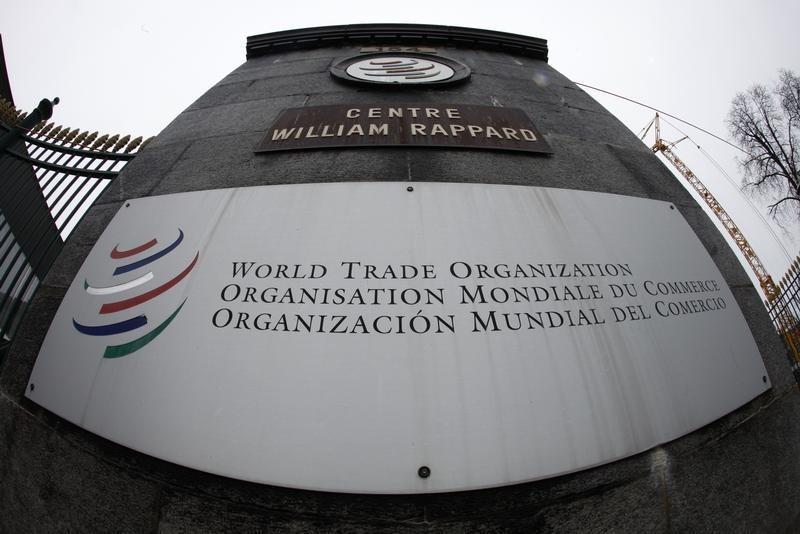Explainer: Current crisis in WTO. Who is responsible?

File photo of the World Trade Organization logo seen at the entrance of the headquarters in Geneva April 9, 2013. REUTERS/Ruben Sprich
“Titanic has hit the iceberg and is now slowly sinking”, this line explains the current situation of the Appellate Body of WTO.[1]
The World Trade Organisation (WTO) is an organization composed mainly of sovereign states that regulates and facilitates international trade between members. It has 164 member states (as of now) which account for over 98% of global trade and global GDP. The organization also administers the Dispute Settlement System for enforcing members’ adherence to the agreements and resolving trade-related disputes.
The Dispute Settlement System of the WTO is given in Annexure 2 to the WTO Agreement titled ‘the Understanding on Rules and Procedures Governing the Settlement of Disputes’ (also known as DSU).
The process of dispute settlement in the WTO can be divided into four steps: –
- Consultation between the parties to resolve the dispute amicably.
- Establishment of the panel in case consultation between the parties fails or is unsuccessful.
- If parties are not satisfied with the report given by the panel, then they can approach Appellate Body as an appeal.
- Implementation and enforcement of the recommendations and ruling of the panel and the Appellate Body, as adopted by the Dispute Settlement Body.
The Appellate Body is a standing organ established by the Dispute Settlement Body (DSB) which is composed of seven members, and it requires three minimum members to hear any case, i.e., a quorum to hear the case. However, currently, the Appellate Body of the WTO is paralyzed due to the frequent use of veto power by the United States (US). The last time the Appellate Body was fully composed (i.e., seven members) is almost 5 years ago (in June 2017).
For more than a decade, the US has been unhappy with the rulings by Appellate Body in cases brought against it. However, the reason for the US being unhappy is that it is being dragged by members before the DSB. The members of the WTO have filed various cases against the US which are pending before the Appellate Body of the WTO. For example,[2]– Brazil – 11, Canada – 20, China – 16, EU – 36, India – 11, Mexico – 10, etc. Since 2011, the US has been vetoing the renewal of Appellate Body members completing their first term as well as the appointment of others to succeed them. Further, the situation became graver when Donald Trump was elected as President of the US whereby making the Appellate Body non-functional (with no member currently).
As a result of this crisis, there are major improvements or reforms required in the WTO. A few of the reforms required are as follows: –
- Multiparty Interim Appeal Arbitration (MPIA): It is an alternative appeal mechanism that came into existence pursuant to Article 25 of the DSU. This agreement is majorly driven by the EU and China, however, not all the members have signed it as of now. This mechanism is like the Appellate Body of WTO consisting of 10 maximum members and 3 minimum members required for a particular case. The MPIA can keep the system functioning in the absence of the Appellate Body, however, it is still too early to comment on the success of the MPIA since there is no case dealt by the MPIA. Further, it is to be kept in mind that this body should maintain high standards so that other countries also trust it.
- Compliance Committee: To ensure that all the members of WTO have trust in Appellate Body, there is a need to set up the Compliance Committee to audit and check the functioning of the Appellate Body every year.
- Other reforms: In order to have the proper functioning of the WTO, there is a suggestion that the minimum member required to hear the case is reduced to one or two from the current minimum required number of members of three. Also, since the veto power often acts as a hindrance to the smooth functioning of the WTO, therefore, there is a requirement that there are reforms required related to the veto power of the members.
Conclusion
Thus, we can conclude that there are various options available for settling disputes, but their impact and success are very little. Also, it cannot be denied that WTO members have lost their right to appeal against the decisions of the WTO panels if this crisis is not resolved immediately which in turn will endanger the future of the organization. If the US keeps blocking appointments of members to the Appellate Body, then this would result in member countries of WTO opting for alternative means. This includes accepting panel reports and constituting another body to resolve their disputes as seen in the case of MPIA. The WTO was set up to help the free flow of trade between the members and to settle disputes peacefully between the members. However, if member countries start looking for other ways to resolve their disputes, it will defeat the very purpose of the WTO.
With the situation still unresolved, the US has begun negotiating bilateral trade agreements with its trading partners, including Mexico, Canada, and China. Other countries have also started to focus more on regional or multiregional trading blocs such as SCO, ASEAN, BIMSTEC, etc. This is a major threat to the WTO’s future and thus destroys the dream of a free and fair global multilateral trading system and makes WTO paralyzed.
References:-
[1] For more info visit: http://asiantradecentre.org/talkingtrade/the-titanic-has-hit-the-iceberg-global-trade-in-profound-trouble







Enjoyed reading this, very good stuff, thanks.
Very interesting info!Perfect just what I was looking for!